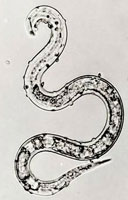Press Releases
Researchers could use bacteria to halt spread of crop-destroying pest – University of Reading
Release Date : 06 February 2004

Environmentally-friendly bacteria could be used to control microscopic, worm-like root-knot nematodes. These soil pests can utterly destroy vegetable crops in the tropics and sub-tropics and are a major problem for smallholders and commercial farmers. Dr Simon Gowen, Mrs Barbara Pembroke and former University of Reading PhD students have been working on this topic for more than 15 years on projects funded by the Department for International Development (DFID) and contracted through Natural Resources International Ltd, which recently won the Small Consultancy Firm of the Year prize at the British International Expertise Awards. "Controlling nematodes is difficult and alternatives to the expensive, toxic and environmentally damaging chemicals are urgently needed," said Dr Gowen, of the University's School of Agriculture, Policy and Development. "The bacterium does have an impact on the nematodes by attaching to them as they move through the soil. "The challenges for scientists are to find simple ways of producing the bacterium, distributing its spores in soil and devising cultural and management practices that enable the bacterium to increase naturally on the nematode population to levels at which crop damage is reduced." Fieldwork is now underway with collaborators in Kenya to find ways of mass-producing and improving the efficacy of the bacterium, Pasteuria penetrans. At the Kenya Agricultural Research Institute, long-term trials are monitoring the populations of the pest and the bacterium, and the field site is being used to demonstrate the principles and methods to smallholders and farmers and also to those wishing to grow crops "organically". The successes of the projects funded by Natural Resources International Ltd and collaboration with the Kenyan Government have promoted modifications to the Kenyan Pest Control Act which will enable the widespread use of biopesticides. Dudutech (Kenya) Ltd, another University of Reading research partner, is planning to distribute P. penetrans under these new regulations. Use of biopesticides will not only help to preserve the environment and health of farmers but also the agricultural export trade through the alleviation of the concerns of UK consumers. end For media enquiries, please contact Craig Hillsley, Press Officer, University of Reading. Tel: (+44) 118 378 7388 E-mail:
c.hillsley@reading.ac.uk

